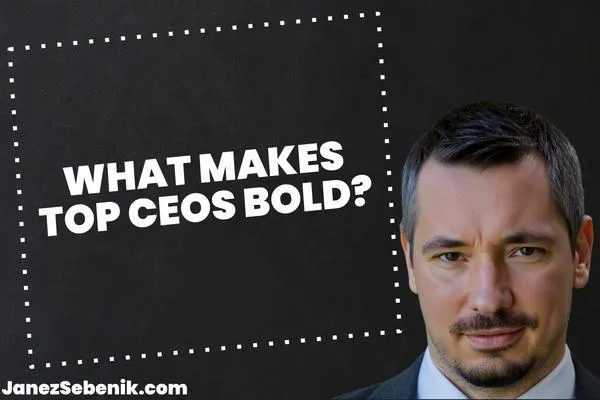
What Personality Type Are Most CEOs?
Ever wonder what makes CEOs tick? It's not just about fancy suits and big offices. The real secret sauce is their personality.
Top CEOs are 66% more likely to be bold risk-takers compared to regular employees. They're the ones who jump into tough changes while others hesitate. It's like they've got an extra dose of courage in their morning coffee.
But it's not just about being daring. CEOs often score high on extraversion and conscientiousness. That means they love being around people and are super organized. It's like they're the perfect mix of party host and librarian.
Key Takeaways
CEOs tend to be bold risk-takers who thrive on challenges
Extraversion and conscientiousness are common traits among top executives
Different industries may require CEOs with varying personality profiles
The CEO Landscape
You're about to dive into the world of big bosses. CEOs come in all shapes and sizes, but they all share one thing - they're at the top of the corporate food chain.
Defining the Role
As a CEO, you're the big kahuna. The head honcho. The top dog.
You're responsible for making the company's biggest moves. These decisions can make or break a business.
Your job? Set the vision, strategy, and culture of the organization. No pressure, right?
You've got to be a jack of all trades. One day you're schmoozing with investors, the next you're putting out fires in HR.
It's not for the faint of heart. But if you've got the chops, it can be one hell of a ride.
Types of CEOs
Now, let's talk about the flavors of CEOs out there. You've got your visionaries, your number crunchers, and everything in between.
Some CEOs are risk-takers. They're the ones who make bold moves and shake things up. Think Elon Musk or Steve Jobs.
Others are more conservative. They play it safe and focus on steady growth. Warren Buffett, anyone?
You've also got your ENTJs and ESTJs. These personality types often excel in the CEO role.
But here's the kicker - there's no one-size-fits-all. The best CEO for a company depends on what that company needs.
Key Personality Traits of Top CEOs
CEOs have some common traits that help them excel. Let's dive into the key personality traits that often set top CEOs apart from the rest.
Conscientiousness in Decision Making
You know those people who always seem to have their shit together? That's conscientiousness in action. Top CEOs are often highly conscientious. They're not just winging it.
These leaders are methodical. They plan, they organize, and they follow through. It's like they've got a superpower for getting things done.
When you're running a company, you can't afford to be flaky. You need to be reliable. You need to be the person who shows up, makes decisions, and sees them through.
Conscientious CEOs are like human Swiss Army knives. They're prepared for anything. They've thought through the scenarios. They've got backup plans for their backup plans.
Extraversion and Leadership
You've seen those CEOs who light up a room, right? That's extraversion at work. Many successful CEOs score high on extraversion. They're the life of the party - but at work.
These leaders thrive on interaction. They're energized by people and exciting environments. It's like they've got social superpowers.
Extraverted CEOs are natural communicators. They can rally the troops with a rousing speech. They can charm investors with their enthusiasm.
But it's not just about being loud. It's about connecting. These CEOs build relationships like it's their job - because it is.
They're comfortable in the spotlight. They don't shy away from tough conversations. They're the face of the company, and they own it.
Openness to Experience and Innovation
Ever met someone who's always got a new idea? That's openness to experience. Great CEOs often have this trait in spades.
They're curious. They're always asking "what if?" They're not satisfied with the status quo. They want to push boundaries.
These CEOs are like kids in a candy store when it comes to new ideas. They get excited about possibilities. They see opportunities where others see obstacles.
But it's not just about having wild ideas. It's about being open to them. These CEOs create cultures where innovation thrives. They encourage their teams to think outside the box.
They're not afraid of change. In fact, they embrace it. They know that in business, standing still is the same as moving backward.
Emotional Stability and Realistic Optimism
You know those people who keep their cool when everyone else is losing it? That's emotional stability. Top CEOs often have this trait in spades.
They're the eye of the storm. When shit hits the fan, they don't panic. They assess, they plan, they act. It's like they've got an internal thermostat that keeps them steady.
But here's the kicker - they're not just calm. They're optimistic. Not in a naive, everything-will-be-fine way. We're talking realistic optimism.
These CEOs see challenges as opportunities. They believe in their ability to overcome obstacles. But they're not delusional. They know the road might be tough.
This combo of stability and optimism is powerful. It helps them navigate crises. It inspires confidence in their team. It keeps the ship steady when the waters get rough.
Agreeableness and Team Dynamics
Now, you might think CEOs are all hard-nosed and tough. But here's a surprise - many successful CEOs score high on agreeableness.
These leaders know how to play nice. They're cooperative. They're considerate. They know that a happy team is a productive team.
But don't mistake agreeableness for weakness. These CEOs aren't pushovers. They're strategic about their kindness.
They use their agreeable nature to build strong teams. They create environments where people want to work. They foster loyalty and commitment.
Agreeable CEOs are masters of diplomacy. They can smooth over conflicts. They can build bridges between different departments or stakeholders.
The Big Five Model and CEOs
The Big Five model sheds light on CEO personalities. It's a powerful tool that helps us understand what makes these leaders tick.
Understanding the Big Five
The Big Five model looks at five key traits. These are openness, conscientiousness, extraversion, agreeableness, and neuroticism.
Think of it like a personality buffet. You get a mix of each trait. Some CEOs might load up on extraversion, while others prefer a bigger helping of conscientiousness.
Each trait is on a scale. You're not just "open" or "not open." It's more like a slider bar in a video game. You can crank it up or dial it down.
These traits shape how CEOs think, act, and lead. They're like the secret ingredients in a leader's special sauce.
Applying the Big Five to CEO Personalities
So, what's in a CEO's personality cocktail? Let's break it down.
CEOs often score high on extraversion and conscientiousness. That means they're outgoing and organized. They love the spotlight and their to-do lists.
Openness is another biggie. CEOs need to be open to new ideas and change. It's like surfing - you've got to ride the waves of innovation.
But here's the kicker: A CEO's personality rubs off on their company. It's like they're painting the company culture with their personality brush.
Your personality as a CEO isn't just about you. It shapes your whole organization. So, next time you're in a meeting, remember: your Big Five traits are leaving a big impact.
Cultivating Success
Want to be a top CEO? It's not just about smarts. You need the right mindset and skills. Let's dive into what makes CEOs tick.
Adaptability and Flexibility
You gotta roll with the punches. Successful CEOs are 66% more likely to take on tough changes. They don't shy away from challenges.
Think of your business like a ship. The seas are always changing. You need to adjust your sails fast.
Got a new competitor? Change your strategy. Market crash? Pivot quickly. The best leaders don't get stuck in their ways.
Flexibility is key. Be open to new ideas. Listen to your team. Sometimes the best solutions come from unexpected places.
The Role of a Strong Sense of Purpose
You need a clear vision. Know why you're doing what you're doing. It's not just about making money.
A strong purpose drives you forward. It keeps you going when things get tough. And trust me, they will get tough.
Your purpose should be bigger than yourself. It should inspire your team. Make them want to come to work every day.
Leaders with a clear purpose create better company cultures. They attract top talent. They keep employees motivated.
For the Greater Good
The best CEOs think beyond profits. They want to make a real difference in the world.
You're not just running a business. You're solving problems. You're improving lives. That's what gets you out of bed in the morning.
Think about your impact. How can your company make the world better? This mindset attracts customers and investors.
Companies focused on the greater good often perform better. They have more loyal customers. Their employees work harder.
Remember, you're not just building a business. You're building a legacy. Make it count.
